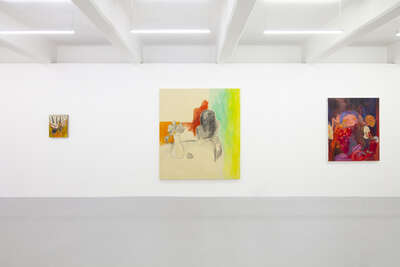LUCÍA VIDALES - CUTE & WILD
FEBRUARY - APRIL, 2025
The time has come, full of joy and knowledge, but also the mysterious hour of death, the rotten air tainted with colors, and the wild wind of the sea. Welcome, one and all, to this exhibition about painting and curious beings.
Sometime during the pandemic, Lucía mentioned to me that watching videos of small animals had made a difference in everything: in understanding that we didn’t know anything, and in seeing that something resembling a powerful friendship or alliance between beings of different species was possible. Our generation also watched these kitten videos to combat a deep sadness whose imaginary past and future I no longer wish to mention under the tyranny of nostalgia, but rather in the living energy we will use as fuel for reconciliation with our present.
Lucía Vidales’ work, for almost two decades now, has persistently posed a question among many others: What about unfinished business, and what kind of vehicles—psychic, historical, emotional—carries it through the traditions and rejections that painting makes possible? In her previous works, we’ve seen uncontrolled fire, legs amputated by St. Cosme and St. Damian, but also lost girls, ghosts afraid of humans, and the people serving the banquet but not sitting at the table: Lucía Vidales recounts all these beings that have appeared in her paintings. They are not asking for revenge but something else: to make us take responsibility for our body-minds, our many-eyed selves, and the vertigo that flashes through uncertainty, whose only companion has often been tenderness.
Eyes, eyisms. Flies with tiny eyes. Self-crushed in mid-flight. As Bruno Enciso aptly rephrased Martin Jay: downcast eyes. Perpetual mourning, but also the long march of beings longing for the vindication of that grief. A friendship and a mystery of the imagination that extend us toward other figures. Vidales’ painting, attuned to the clear mastery she already has over color, simultaneously affirms traditions in the use of density and transparency, and a near-seamless leap between overlays of brilliant acrylics, glassy oils, or muddy mediums. The result is a constant update of the painting-drawing relationship through the chromatic unreality of a world narrated by painting as a historical and emotional witness, informed by small, vibrant, transparent beings, like those on our screens. Indeterminations of light emission and reception, and an oscillation between something radically awake and the reverie of numbed lights.
The flame burning in closed eyes is patient. It sees many things with its anti-light, for it does not fear time. Thus, the glances at the external world by the creatures traversing these territories are also a window inward, where the time Lucía has woven into her painting collapses in the clairvoyance of an extinction event. Ours and another’s, animated without hierarchies, now becoming survival, leading beings to displacement, wandering, and vagrancy. There, we will find cute and wild, among deserts, magical caves, and poisoned bays. Mischievous beings. Fluttering crookedly, taking short or odd steps, with tiny shoes or little paws. But also distrusting the stranger, the watcher, who asks them where they are going, thinking he knows the way. “Nobody knows the way,” they reply, with these looks:
This crossroads among the characters inhabiting the edges of the paintings, the backgrounds, and the strokes—characters that can only recall the confrontation that will come someday—also stokes the fires of a displacement toward other stories, where Vidales’ work embraces this Earth’s tales and violences. This is why I would like to end this invitation by recalling the words that writer Marcel Schwob penned in the voice of Gregory IX, once used by Sergio González Rodríguez to speak about Ciudad Juárez and the women murdered there. After speaking with the Mediterranean Sea, which he blames for devouring the children boarded on the children’s crusade, the Pope proposes building a church for the New Innocents and establishing twelve prebendaries. In return:
You will return the bodies of my children, innocent and consecrated sea; you will deposit them on the island's shores; and the prebendaries will place them in the temple’s crypts, lighting eternal lamps above, where holy oils will burn, showing travelers these white little bones scattered through the night.
Christian Camacho






